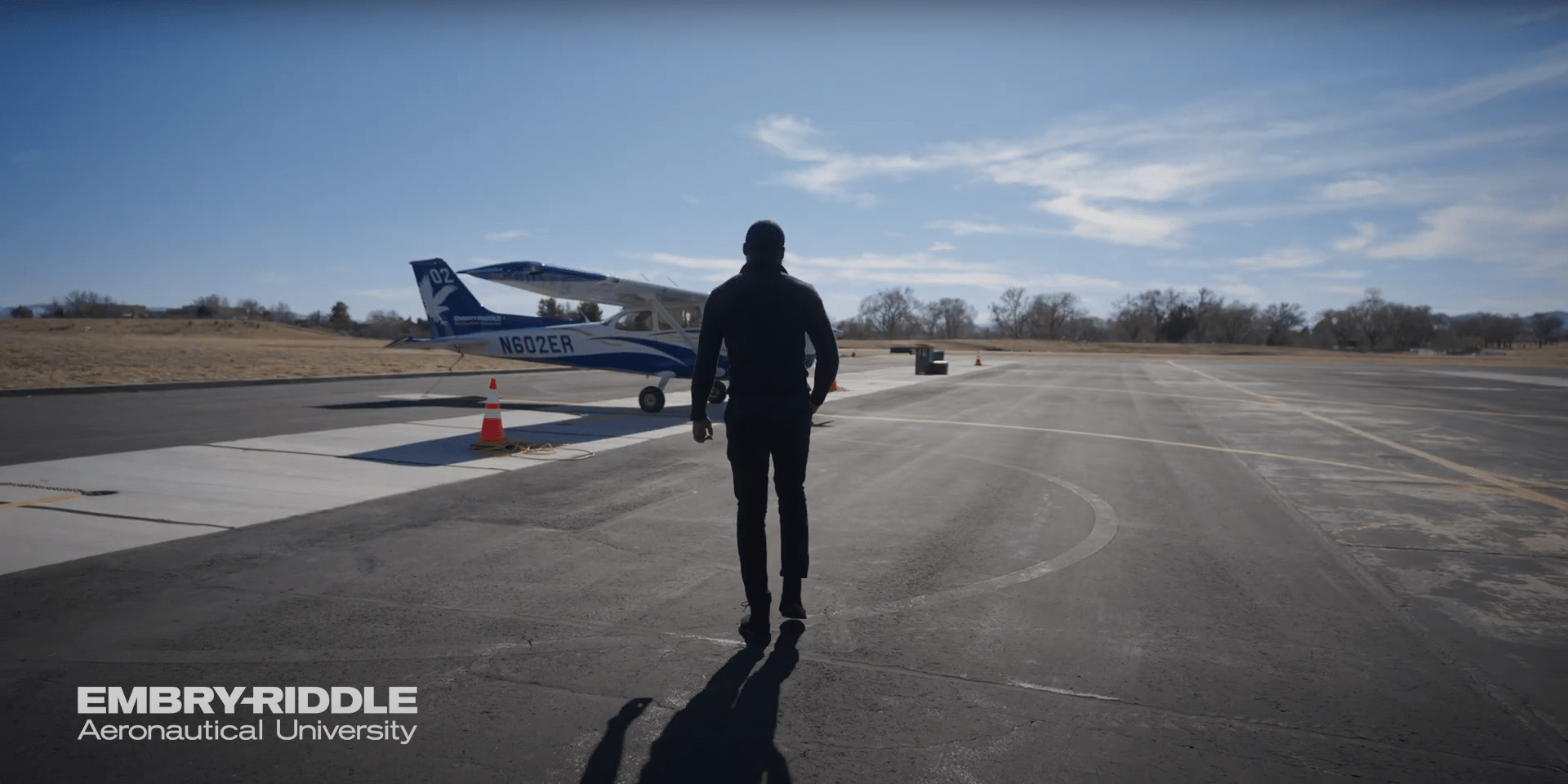
Bachelor of Science in
Interdisciplinary Studies
The B.S. in Interdisciplinary Studies is designed to nurture critical thinkers who understand the connections between science, technology and humanity.
About the Bachelor of Science in Interdisciplinary Studies
The Bachelor of Science in Interdisciplinary Studies is specifically designed for students who have a wide range of interests or have explored multiple degree programs and found several appealing. This program offers students access to state-of-the-art labs, cutting-edge technology and the guidance of dedicated, industry-leading professors.
As students tailor their Interdisciplinary Studies degree to their individual interests, they are presented with the opportunity to immerse themselves in academic experiences and hands-on learning, providing them with the competitive edge needed to pursue esteemed positions with leading employers.
Why You Should Study this Degree
Interdisciplinary Studies explores how different academic subjects connect to gain a better understanding of complex topics or issues. A degree in interdisciplinary studies may be for you if you:
- Enjoy combining innovation with multiple passions
- Have a variety of unique interests
- Want to prepare for diverse career opportunities
Student Learning Outcomes
Interdisciplinary research opportunities you will have while pursuing a degree:
- Communicate disciplinary concepts through written, digital and oral presentations for technical and non-technical audiences.
- Evaluate problems or challenges within a career field related to their minors.
- Synthesize information from various disciplines related to their minors into a comprehensive understanding.
- Use digitally enabled technology to interpret data.
Interdisciplinary Studies Career Opportunities
Careers and Employers
Embry-Riddle Interdisciplinary Studies graduates are set to enter the workforce with a placement rate of 100% within a year of graduation, often continuing in areas such as:
- Aviation
- Aerospace
- Business
- Graduate Studies
- Law School
- The U.S. Military
Interdisciplinary degree graduates tend to enter the industry with companies such as:
- American Airlines
- Lockhead Martin
- NASA
- Republic Airlines
- Space X
- The White House
Interdisciplinary Studies Salary Information
Graduates with a Bachelor of Science in Interdisciplinary Studies tend to receive competitive salaries, with an average income of $117,100 annually, as of 2022.
DETAILS
About Interdisciplinary Studies at the Worldwide & Online Campus
The B.S. in Interdisciplinary Studies gives students the opportunity to design a customized curriculum that connects science, technology and humanity. Graduates can pursue careers in aviation, aerospace, international business, communication or related fields.
The program is part of the Air University-Associate to Baccalaureate Cooperative (AU-ABC Category I), which allows Community College of the Air Force (CCAF) associate's degree holders to enroll. Core courses focus on improving communication and analytical skills, while the interdisciplinary nature of the program enables students to choose a minor course of study, expanding their knowledge and global aspirations.
Interdisciplinary Studies Information
- Credits: 120
- Online or In-Person: Fully online
- Capstone: Senior Capstone (3 credits)
Helpful Links
- Attend a Worldwide Virtual Info Session
- Explore the Fields of Study: Applied Science & Aviation & Computers & Technology & Engineering & Security, Intelligence and Safety & Space
- Find Related Clubs & Organizations
Student Learning Outcomes
Students will:
- Evaluate problems or challenges within a career field related to their minors.
- Use digitally-enabled technology to interpret data.
- Apply meaningful interdisciplinary research to a capstone project or document that correctly uses an approved documentation system.
- Communicate disciplinary concepts through written, digital, and oral presentations for technical and non-technical audiences.
- Synthesize information from various disciplines related to their minors into a comprehensive understanding.
DEGREE REQUIREMENTS
The Bachelor of Science in Interdisciplinary Studies degree requires successful completion of a minimum of 120 credit hours. Included in the 120 credit hours must be 40 credit hours of upper-division courses (300-400 level).
General Education Requirements
For a full description of Embry-Riddle General Education guidelines, please see the General Education section of this catalog. These minimum requirements are applicable to all degree programs.
| Communication Theory and Skills | 9 | |
| Lower-Level Humanities | 3 | |
| Lower-Level Social Sciences | 3 | |
| Lower or Upper-Level Humanities or Social Sciences | 3 | |
| Upper-Level Humanities or Social Sciences | 3 | |
| Computer Science | 3 | |
| Mathematics | 6 | |
| Physical and Life Sciences | 6 | |
| Total Credits | 36 | |
| Communication Theory and Skills | ||
| Transfer English Composition or take: | 3 | |
ENGL 123 | English Composition | |
| Transfer in up to six (6) credit hours of writing, communication or speech courses or take two Speech/English courses | 6 | |
| Lower Level Humanities | ||
| Transfer up to three (3) credit hours of 100 or 200 level Humanities courses or take a Humanities course (Lower Level) | 3 | |
| Lower Level Social Sciences | ||
| Transfer up to three (3) credit hours of Lower Level Social Sciences or take a Social Science elective (Lower Level) | 3 | |
| Lower or Upper Level Humanities or Social Sciences | ||
| Transfer lower or upper Humanities or Social Sciences credit or select a non-duplicated Humanities or Social Science elective (lower or upper level) | 3 | |
| Upper Level Humanities or Social Sciences | ||
| Transfer up to three (3) credit hours of upper level Humanities or Social Science or take a Humanities or Social Science elective, (Upper Level) *International Relations minor students may be required to take a humanities course to satisfy this requirement. | 3 | |
| Computer Sciences | ||
| Transfer three (3) credit hours of 100 level or above computer science course credit or take one of the following courses to satisfy Computer Science requirements. The course used to satisfy the General Education Computer Science requirement cannot also be used to satisfy a Core/Major or Minor requirement: | 3 | |
CSCI 109 | Introduction to Computers and Applications | |
CSCI 123 | Introduction to Computing for Data Analysis | |
CYBR 235 | Computer and Network Technologies | |
| Mathematics | ||
| Take six (6) credit hours from any MATH series courses (excluding MATH 100 and MATH 106) or transfer in direct equivalents. | 6 | |
| Physical and Life Sciences | ||
| Transfer up to six (6) credit hours of physical/life science courses or take one or two Physical and Life Sciences courses (as appropriate to add up to a total of 6 semester hours). | 6 | |
Core Requirements / Categories
| Aviation Foundation | ||
| Select one of the following: | 3 | |
ASCI 202 | Introduction to Aeronautical Science | |
HIST 130 | History of Aviation in America | |
| Humanities | ||
| Transfer up to three (3) additional credit hours of humanities upper or lower -or- take a 3 credit hour upper or lower level Humanities course. | 3 | |
| Management Foundation | ||
| Transfer three (3) 100 level or above Management credit hours or choose one Embry-Riddle Management elective. | 3 | |
| Interdisciplinary Research and Skills | ||
| Transfer a three (3) credit hour of a 100 level or above Research Methods course or take: | 3 | |
RSCH 202 | Introduction to Research Methods | |
| Transfer three (3) credit hours of 100 level or above Statistics course or select one from below: | 3 | |
STAT 211 | Statistics with Aviation Applications | |
STAT 222 | Business Statistics | |
| International Perspectives | ||
| Transfer three (3) upper level credit hour Government course or take a three 3 credit hour upper level Government course. | 3 | |
| Philosophical Perspectives | ||
| Transfer three (3) credit hours upper level Ethics course or take: | 3 | |
HUMN 330 | Values and Ethics | |
| Upper-Level Literature | ||
| Transfer three (3) credit hour upper level Humanities or Literature course or take an upper level Humanities or Literature course | 3 | |
| Upper-Level Communication | ||
| Transfer three (3) credit hour upper level Communications or English course or select an upper level COMD or ENGL course | 3 | |
| Senior Capstone | ||
| BSIS 473 | Interdisciplinary Studies Capstone | 3 |
| Total Core Requirements | 30 | |
View Minors: https://nextcatalog.erau.edu/worldwide/minors/
| Available Minors | ||
The Military Studies minor is available exclusively to BSIS students. BSIS students must select two or three minor fields of study. Required credits in each minor vary, depending on the minor(s) chosen. Examples of minors and required credits are shown below but can change. Please consult the Worldwide Minor Courses of Study page for up to date list. Courses taken in minors cannot duplicate (be double-counted for) requirements in other areas.
Students may select any combination of two minors, but are cautioned that some minor combinations will result in degree totals exceeding 120 credits. Additionally, students should work with their academic advisors to assure that university upper-level course graduation requirements will be fulfilled with their selected minors, or undertake additional coursework to fulfill the requirement.
| Total Credits (for first Minor) | 15/22 | |
| Total Credits (for second Minor) | 15/22 | |
| Specialization | 15 | |
| Specialty Area of related courses can be taken at ERAU or transferred from another college or university. | ||
| Open Electives | 0/9 | |
| Open Electives (Any shortages in the required upper level hours will be made up in this area). | 0/9 | |
| Total Degree Credits | (Minimum) 120 | |
| (at least 40 semester hours need to be upper level coursework) | ||
B.S. in Interdisciplinary Studies to M.S. in Human Security and Resilience
Students who are accepted into the program, spend three academic years in undergraduate-level study, minoring in Homeland Security or Emergency Services, and then, at the beginning of their senior year (having earned at least 75 credit hours with a 3.00 CGPA), will take up to three graduate-level courses that will meet undergraduate and graduate program requirements (when a B grade or better is achieved). Upon completion of the BSIS requirements, students will be enrolled in the Master of Science in Human Security and Resilience (MSHSR) degree for completion on an accelerated timeline. In any graduate course taken by an undergraduate student, a grade of B or better must be earned. If a grade of C or F is earned in the MSHSR graduate courses taken for BSIS credit, the student will be removed from the program, have credit awarded to the BSIS degree only, and may continue to complete the BSIS degree.
Students initiate program acceptance through their Academic Advisor or Campus Advisor; to help ensure program criteria are met. Student Advisor will complete the request for processing into the program.
Get Started Now:
Summary
120 Credits
Estimate your tuition by using the Tuition Calculator
View Financial Aid Information
Learn more about the benefits of an Online Degree
Learn about our General Education
Find out about transferring credits to this degree
Learn more about our Veterans & Military benefits
View our Academic Calendar
Search Courses for this degree




